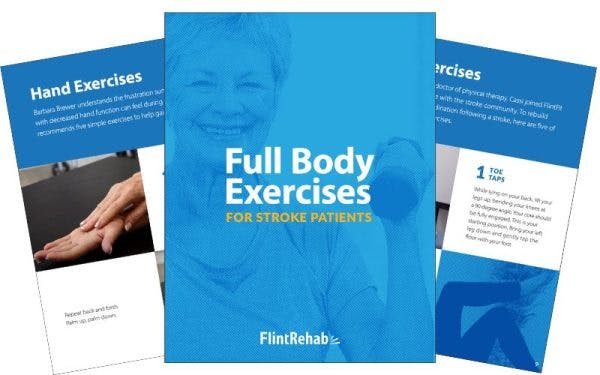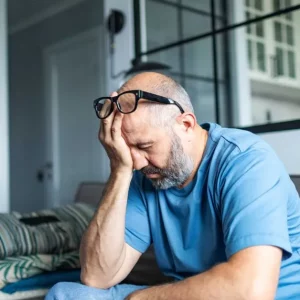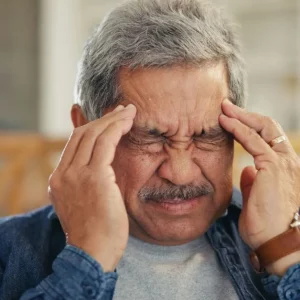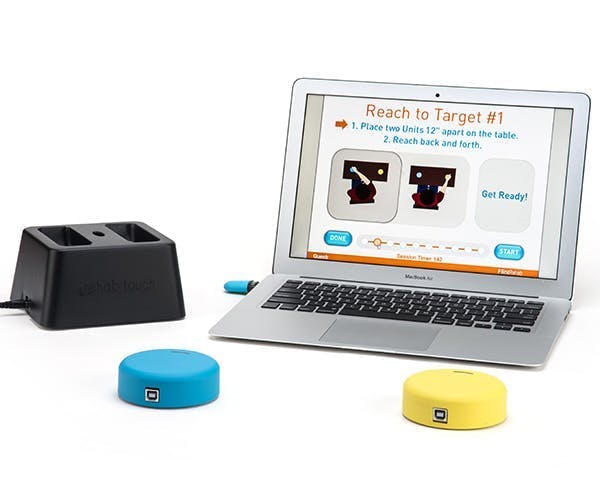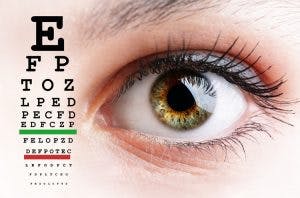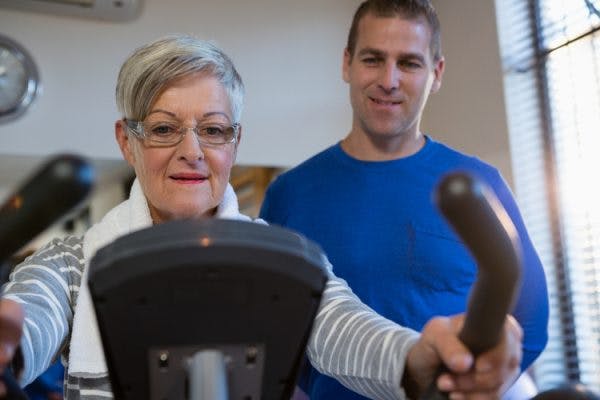Anger after stroke can occur for many reasons. Changes in emotional regulation after stroke may occur due to altered brain chemistry or as a result of damage to specific areas of the brain. Anger may also result from unwanted lifestyle changes, such as losing a job due to stroke-related impairments.
It is important to address concerns regarding anger after stroke because it can cause distress for both survivors and their loved ones. This article will identify potential causes of anger after stroke and outline recommended treatment and management strategies. Use the links below to jump directly to any section:
Defining Anger After Stroke
Following a stroke, individuals may experience a wide range of emotions, including anger. In fact, studies have shown that between 11-35% of stroke survivors experience anger or aggressive behaviors during the acute stage of stroke, while 19-32% experience anger during the first 3-12 months following a stroke.
While anger tends to subside over time, it can be very taxing on both the survivor and their loved ones. Symptoms of post-stroke anger may include:
- Aggressive behaviors, such as hitting
- Irritability
- Hostility
- Difficulty getting along with family members
While anger may occur after stroke, it can also be a risk factor for having a stroke. In fact, studies have found that acute anger and other emotional upsets can play a role in triggering stroke.
Therefore, for some survivors, anger is not a new symptom, but is something they have been struggling with even before their stroke occurred. To effectively address anger, survivors and their families should consider whether anger is a new development or if anger has lessened or intensified after stroke.
Causes of Anger After Stroke
Following a stroke, individuals often experience emotional changes resulting from one or multiple sources. Changes in brain chemistry, difficulty adjusting to new neurological deficits, and genetic predisposition may contribute to the development of anger after stroke. Other factors that may cause anger after stroke include:
- Cognitive changes. A stroke may cause changes in the brain that alter a person’s ability to process information and understand others. Some of these changes, such as lack of empathy or increased impulsivity, can result in frequent feelings of anger.
- Physical effects. Motor impairments and pain are some of the most common secondary effects of a stroke. These physical challenges can make it difficult to engage in typical daily tasks, such as self-care, work, and leisure activities. Struggling with activities that used to be second-nature can cause frustration and anger.
- Emotional disorders. When a stroke affects the emotion center of the brain, it can cause a condition called pseudobulbar affect. This involves involuntary, inappropriate, and uncontrollable outbursts of emotion such as laughter, crying, or anger, particularly when a situation does not call for such emotion. Anger may also be related to other emotional disorders or mental health conditions, such as post-stroke depression.
When anger after stroke becomes extreme, it can result in aggressive behavior after stroke, which should be taken seriously. If you or a loved one are a victim of domestic violence, it is critical to take action to protect yourself by calling the domestic abuse hotline in your area. In the United States, that number is 1-800-799-7233.
Common Triggers of Anger After Stroke
To learn how to regulate anger after stroke, it is critical to understand the factors that may trigger the emotion. Some common triggers for anger include:
- Perceived lack of control. The road to recovery is full of challenges, such as navigating institutions like therapy centers, insurance coverage, and government-funded disability programs. While working through these systems, survivors may feel like situations are outside of their control, which can lead to anger.
- Difficulty performing tasks. Since stroke survivors often experience motor and/or cognitive impairments, typical daily activities may become challenging to perform. This can provoke frustration and anger.
- Fatigue or confusion. Post-stroke fatigue and cognitive difficulties can heighten emotional reactions like anger.
- Other peoples’ behavior. Stroke survivors may be faced with insensitive comments and other challenges that can trigger anger.
- Anxiety and overstimulation. When the brain is recovering from a stroke, it can heighten anxiety and the possibility of overstimulation. This is especially apparent in situations with large crowds, excess noise, or excess activity, which can become overwhelming and trigger anger.
- Barriers to goals or routines. Stroke recovery can be a slow process. Even if the survivor is making progress, it can be upsetting to have to change one’s daily routines or modify goals due to persistent impairments.
Individuals without health challenges may feel confronted by one of these triggers at any given time. However, individuals recovering from a stroke are often confronted by multiple triggers at once, which can heighten angry reactions.
Managing Anger After Stroke
In many cases, episodes of post-stroke anger and aggressive behavior decline in frequency and intensity as time passes. As the brain heals and survivors adjust to new situations, they may naturally regain control over their emotions.
However, it is typically recommended that survivors take a proactive approach to managing emotions rather than passively waiting for things to improve. Here are some steps to help reduce angry feelings after a stroke:
1. Avoid Triggers
Recognizing the situations that trigger anger after a stroke may help survivors manage their moods. Stroke survivors are often confronted by multiple triggers at once, so it is vital to be aware of potential triggers in order to reduce or avoid them. Talking with a psychotherapist may also help survivors identify potential triggers and learn how to modify their responses.
2. Take a Break
Many anger triggers involve frustration from unrealistic expectations or overexertion. When survivors feel themselves growing confused or frustrated from not being able to complete certain tasks, taking a break can help to prevent these feelings from intensifying into anger.
Stroke recovery is a challenging process, and survivors should practice self-compassion to make an already difficult process more manageable. This can include stepping back from frustrating situations and practicing anger coping mechanisms, such as:
- Deep breathing
- Listening to relaxing music
- Meditation and prayer
- Physical exercise
- Closing the eyes
- Expressing emotions through journaling or artwork
Individuals who struggle with unwinding and stepping back from difficult tasks can also use leisure activities as a distraction. Taking time to relax and regroup may allow feelings of anger to subside.
3. Consider Medications
If anger is reducing quality of life or damaging relationships with loved ones, individuals may benefit from pharmacological interventions. A class of antidepressants referred to as selective serotonin reuptake inhibitors (SSRIs) are often considered first-line medications for post-stroke anger. Medications may also be used in conjunction with other anger management techniques for enhanced benefits.
Be aware that, as with all medication, there may be side effects that can negate potential benefits. For example, some side effects of SSRIs include anxiety, confusion, and difficulty falling asleep. This can provoke certain triggers for anger, such as fatigue and overstimulation, so survivors should exercise caution and work closely with their doctors to monitor their health.
Strategies for Loved Ones to Prevent Anger Proneness
Navigating anger after stroke can be challenging for both the survivor and their loved ones. Family members and caregivers can help survivors keep their emotions regulated by reducing triggers and minimizing frustration as appropriate. The following tips can help accomplish this.
Demonstrate Empathy
First and foremost, it is important for loved ones to remember that a stroke survivor’s anger is often not directed toward those around them, but rather at their limitations. By practicing empathy and compassion, loved ones can learn not to take angry words and actions personally, but rather to try to understand the deeper problem.
Responding gently and compassionately, rather than starting an argument or debate, can help survivors feel heard and understood. While this is easier said than done, taking time to respond patiently and intentionally can help to relieve anger rather than adding to it.
Validate Feelings (when appropriate)
Validating survivors’ feelings when they are angry or upset can help to diffuse the situation. Since anger is often triggered by upsetting circumstances, such as physical limitations or insensitive comments, it is appropriate to validate feelings of hurt, frustration, and anger directed at these situations.
Practice Self-Care
Being a caregiver for a stroke survivor can be difficult, and angry outbursts add additional stress to the situation. Caregivers and family members should regularly practice self-care routines like attending support groups, seeing a therapist, participating in leisure activities, and maintaining healthy boundaries.
Although caring for stroke survivors is important, if anger turns into violent or aggressive behavior after stroke, immediately call the domestic abuse hotline. This can help both caregivers and survivors get the help that they need to be safe and continue toward recovery.
Understanding Anger After Stroke
Anger after stroke affects many survivors and their families, especially throughout the first stages of recovery. While taking medications, avoiding triggers, and stepping back from frustrating situations can help survivors to regulate their emotions, loved ones can also play a vital role in reducing anger.
When loved ones understand that survivors are often frustrated with the biological impact of the stroke itself, it becomes easier to not take anger personally. Responding to anger with empathy and validating feelings of frustration can help to diffuse situations.
To further relieve anger, loved ones and survivors can work together to reduce triggers within their control, such as avoiding crowded areas, encouraging naps to reduce fatigue, and celebrating progress throughout recovery. Anger after stroke can be difficult for survivors and their families to cope with, but there is always hope for recovery.

